无被动语态的动词
英语不能用被动语态的情况

不能用被动语态的情况初中语法:1) 不及物动词或动词短语无被动语态:appear, die disappear, end (vi. 结束), fail, happen, last, lie, remain, sit, spread, stand break out, come true, fall asleep, keep silence, lose heart, take place.After the fire, very little remained of my house.比较:rise, fall, happen是不及物动词;raise, seat是及物动词。
(错) The price has been risen.(对) The price has risen.(错) The accident was happened last week.(对) The accident happened last week.(错) The price has raised.(对) The price has been raised.(错) Please seat.(对) Please be seated.要想正确地使用被动语态,就须注意哪些动词是及物的,哪些是不及物的。
特别是一词多义的动词往往有两种用法。
解决这一问题唯有在学习过程中多留意积累。
2) 不能用于被动语态的及物动词或动词短语:fit, have, hold, marry, own, wish, cost, notice, watch agree with, arrive at / in, shake hands with, succeed in, suffer from, happen to, take part in, walk into, belong to This key just fits the lock.Your story agrees with what had already been heard.3) 系动词无被动语态:appear, be become, fall, feel, get, grow, keep, look, remain, seem, smell, sound, stay, taste, turnIt sounds good.4) 带同源宾语的及物动词,反身代词,相互代词,不能用于被动语态:die, death, dream, live, lifeShe dreamed a bad dream last night.5) 当宾语是不定式时,很少用于被动语态。
初中英语语法大全:不用被动语态

初中英语语法大全:不用被动语态各位读友大家好,此文档由网络收集而来,欢迎您下载,谢谢初中英语语法大全:不用被动语态不用被动语态的情况1) 不及物动词或动词短语无被动语态:appear, die disappear, end , fail, happen, last, lie, remain, sit, spread, stand break out, come true, fall asleep, keep silence, lose heart, take place.After the fire, very little remained of my house.比较:rise, fall, happen是不及物动词;raise, seat是及物动词。
The price has been risen.The price has risen.The accident was happened last week.The accident happened last week.The price has raised.The price has been raised.Please seat.Please be seated.要想正确地使用被动语态,就须注意哪些动词是及物的,哪些是不及物的。
特别是一词多义的动词往往有两种用法。
解决这一问题唯有在学习过程中多留意积累。
2) 不能用于被动语态的及物动词或动词短语:fit, have, hold, marry, own, wish, cost, notice, watch agree with, arrive at / in, shake hands with, succeed in, suffer from, happen to, take part in, walk into, belong toThis key just fits the lock.Your story agrees with what had already been heard.3) 系动词无被动语态:appear, be become, fall, feel, get,grow, keep, look, remain, seem, smell, sound, stay, taste, turnIt sounds good.4) 带同源宾语的及物动词,反身代词,相互代词,不能用于被动语态:die, death, dream, live, lifeShe dreamed a bad dream last night.5) 当宾语是不定式时,很少用于被动语态。
不及物动词没有被动语态
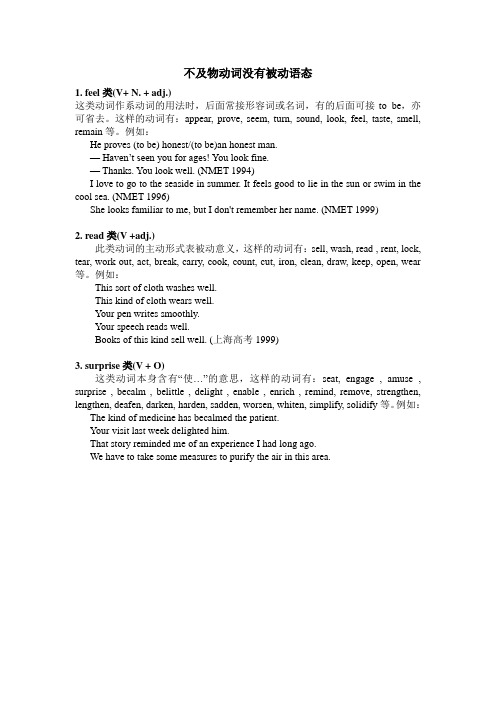
不及物动词没有被动语态1. feel类(V+ N. + adj.)这类动词作系动词的用法时,后面常接形容词或名词,有的后面可接to be,亦可省去。
这样的动词有:appear, prove, seem, turn, sound, look, feel, taste, smell, remain等。
例如:He proves (to be) honest/(to be)an honest man.—Haven’t seen you for ages! You look fine.— Thanks. You look well. (NMET 1994)I love to go to the seaside in summer. It feels good to lie in the sun or swim in the cool sea. (NMET 1996)She looks familiar to me, but I don't remember her name. (NMET 1999)2. read类(V +adj.)此类动词的主动形式表被动意义,这样的动词有:sell, wash, read , rent, lock, tear, work out, act, break, carry, cook, count, cut, iron, clean, draw, keep, open, wear 等。
例如:This sort of cloth washes well.This kind of cloth wears well.Your pen writes smoothly.Your speech reads well.Books of this kind sell well. (上海高考1999)3. surprise类(V + O)这类动词本身含有“使…”的意思,这样的动词有:seat, engage , amuse , surprise , becalm , belittle , delight , enable , enrich , remind, remove, strengthen, lengthen, deafen, darken, harden, sadden, worsen, whiten, simplify, solidify等。
动词的主动形式表示被动

动词的主动形式表示被动之意一、系动词无被动语态:以主动形式表示被动之意常见的系动词有:①be 动词②. 起来(7 个):look/seem/appear, feel(感觉,摸起来),sou nd, smell, tastee.g. She seems/appears happy. It smells terrible.③(逐渐)变得/变成:become, grow, get, turn, come, goe.g. His wish has come true.People often went hungry in the old days.The tree is growing tall.④保持:keep, staye.g. We must keep quiet in the reading room.二、下列动词(词组)没有被动式:1、happen, take place, break out, belong to ,cost, take2、不及物动词sell, wash, read , write, open, close, shut, lock, wear 等,常用主动形式表示被动意义。
Ol、An accident was happened yesterday. (x)昨天发生了一起事故。
An accident happened yesterday.O2、The flower smells sweet. 这花闻起来很香。
O3、The watch looks good. 这表看起来很好。
O4、This book sells well. 这本书畅销。
O5、The kind of cloth washes well. 这种布很容易洗。
O6、The article reads well. 这篇文章读起来很好。
O7、The supermarket opens at 8:00 in the morning. 超市在早上八点钟营业。
初中常见无被动语态的动词__概述说明以及解释
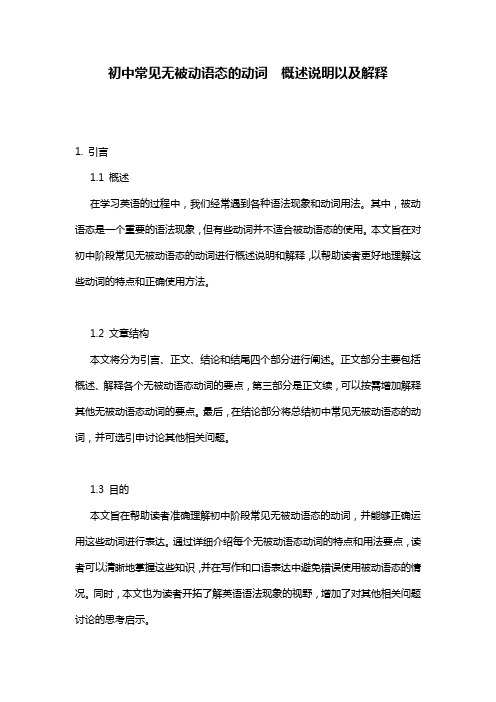
初中常见无被动语态的动词概述说明以及解释1. 引言1.1 概述在学习英语的过程中,我们经常遇到各种语法现象和动词用法。
其中,被动语态是一个重要的语法现象,但有些动词并不适合被动语态的使用。
本文旨在对初中阶段常见无被动语态的动词进行概述说明和解释,以帮助读者更好地理解这些动词的特点和正确使用方法。
1.2 文章结构本文将分为引言、正文、结论和结尾四个部分进行阐述。
正文部分主要包括概述、解释各个无被动语态动词的要点,第三部分是正文续,可以按需增加解释其他无被动语态动词的要点。
最后,在结论部分将总结初中常见无被动语态的动词,并可选引申讨论其他相关问题。
1.3 目的本文旨在帮助读者准确理解初中阶段常见无被动语态的动词,并能够正确运用这些动词进行表达。
通过详细介绍每个无被动语态动词的特点和用法要点,读者可以清晰地掌握这些知识,并在写作和口语表达中避免错误使用被动语态的情况。
同时,本文也为读者开拓了解英语语法现象的视野,增加了对其他相关问题讨论的思考启示。
2. 正文:2.1 无被动语态的动词概述:在初中英语中,有一些动词是没有被动语态形式的。
被动语态是指动作的承受者处于主语位置,而执行动作的人或物则放在谓语之后。
然而,某些动词却没有这种被动形式,即它们不能被转换为被动语态。
本节将对常见的这类无被动语态的动词进行概述。
2.2 解释第一个无被动语态动词要点:首先,我们来解释一下第一个常见无被动语态的动词要点。
该要点是指该组别中的第一个无法构成被动语态的动词。
例如,"enjoy"(享受)就是这样一个常见例子。
我们可以说"I enjoy playing basketball."(我喜欢打篮球),但不能使用其被动形式。
2.3 解释第二个无被动语态动词要点:接下来,我们解释一下第二个常见无被动语态的动词要点。
这个要点是概括了另一个不具备被动形式的常用英语单词。
考虑到节约空间和时间,"believe"(相信)可以作为第二个示例。
不及物动词没有被动语态
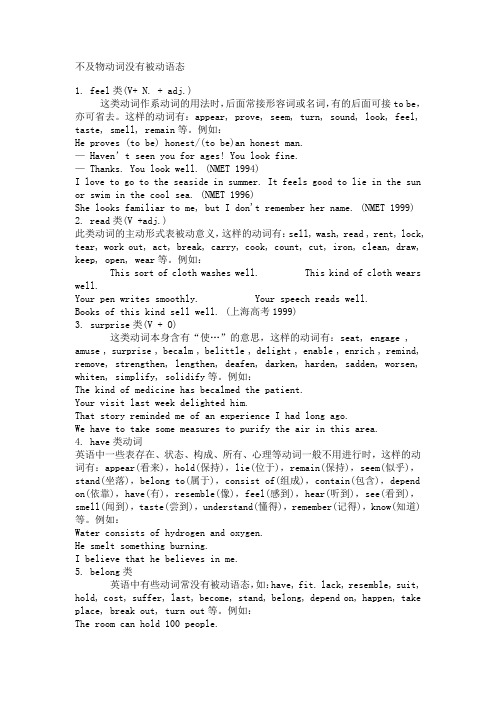
不及物动词没有被动语态1. feel类(V+ N. + adj.)这类动词作系动词的用法时,后面常接形容词或名词,有的后面可接to be,亦可省去。
这样的动词有:appear, prove, seem, turn, sound, look, feel, taste, smell, remain等。
例如:He proves (to be) honest/(to be)an honest man.—Haven’t seen you for ages! You look fine.— Thanks. You look well. (NMET 1994)I love to go to the seaside in summer. It feels good to lie in the sun or swim in the cool sea. (NMET 1996)She looks familiar to me, but I don't remember her name. (NMET 1999) 2. read类(V +adj.)此类动词的主动形式表被动意义,这样的动词有:sell, wash, read , rent, lock, tear, work out, act, break, carry, cook, count, cut, iron, clean, draw, keep, open, wear等。
例如:This sort of cloth washes well. This kind of cloth wears well. Your pen writes smoothly. Your speech reads well.Books of this kind sell well. (上海高考1999)3. surprise类(V + O)这类动词本身含有“使…”的意思,这样的动词有:seat, engage , amuse , surprise , becalm , belittle , delight , enable , enrich , remind, remove, strengthen, lengthen, deafen, darken, harden, sadden, worsen, whiten, simplify, solidify等。
无被动语态的动词及短语
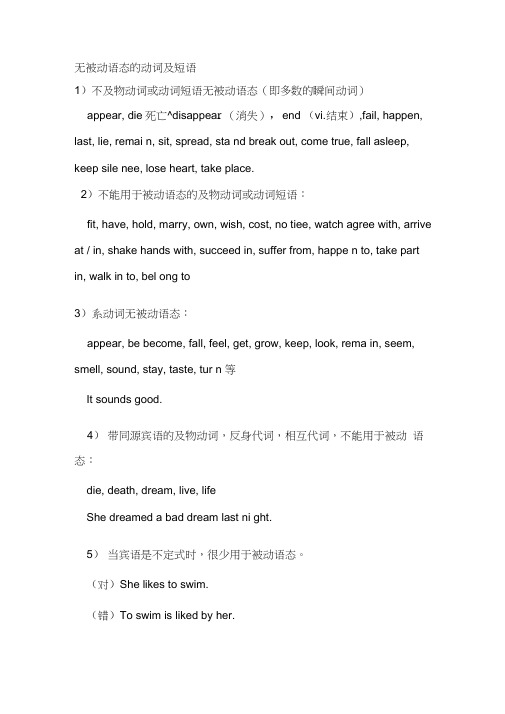
无被动语态的动词及短语
1)不及物动词或动词短语无被动语态(即多数的瞬间动词)
appear, die死亡^disappea r (消失),end (vi.结束),fail, happen, last, lie, remai n, sit, spread, sta nd break out, come true, fall asleep, keep sile nee, lose heart, take place.
2)不能用于被动语态的及物动词或动词短语:
fit, have, hold, marry, own, wish, cost, no tiee, watch agree with, arrive at / in, shake hands with, succeed in, suffer from, happe n to, take part in, walk in to, bel ong to
3)系动词无被动语态:
appear, be become, fall, feel, get, grow, keep, look, rema in, seem, smell, sound, stay, taste, tur n 等
It sounds good.
4)带同源宾语的及物动词,反身代词,相互代词,不能用于被动语态:
die, death, dream, live, life
She dreamed a bad dream last ni ght.
5)当宾语是不定式时,很少用于被动语态。
(对)She likes to swim.
(错)To swim is liked by her.。
感官动词无被动的用法
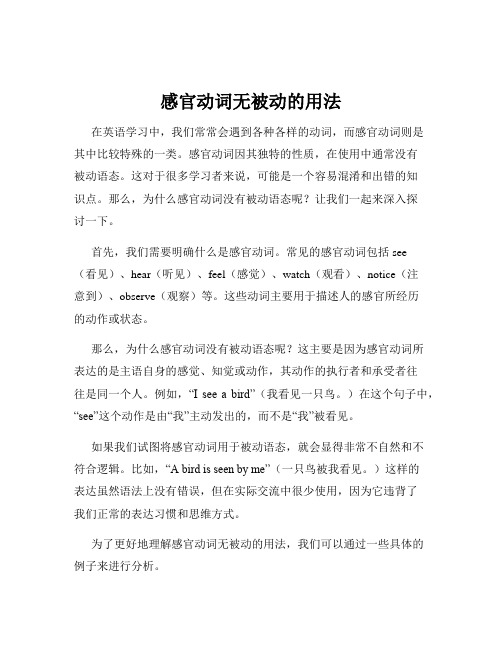
感官动词无被动的用法在英语学习中,我们常常会遇到各种各样的动词,而感官动词则是其中比较特殊的一类。
感官动词因其独特的性质,在使用中通常没有被动语态。
这对于很多学习者来说,可能是一个容易混淆和出错的知识点。
那么,为什么感官动词没有被动语态呢?让我们一起来深入探讨一下。
首先,我们需要明确什么是感官动词。
常见的感官动词包括 see(看见)、hear(听见)、feel(感觉)、watch(观看)、notice(注意到)、observe(观察)等。
这些动词主要用于描述人的感官所经历的动作或状态。
那么,为什么感官动词没有被动语态呢?这主要是因为感官动词所表达的是主语自身的感觉、知觉或动作,其动作的执行者和承受者往往是同一个人。
例如,“I see a bird”(我看见一只鸟。
)在这个句子中,“see”这个动作是由“我”主动发出的,而不是“我”被看见。
如果我们试图将感官动词用于被动语态,就会显得非常不自然和不符合逻辑。
比如,“A bird is seen by me”(一只鸟被我看见。
)这样的表达虽然语法上没有错误,但在实际交流中很少使用,因为它违背了我们正常的表达习惯和思维方式。
为了更好地理解感官动词无被动的用法,我们可以通过一些具体的例子来进行分析。
比如说,“I heard her singing”(我听见她在唱歌。
)这里“heard”是感官动词,表达的是“我”主动听到的这个动作。
如果要改成被动语态“Her singing was heard by me”(她的唱歌被我听到。
)就显得很别扭。
再看“ I felt the wind blowing”(我感觉到风吹着。
)“felt”是感官动词,描述的是“我”自身的感觉。
若改成被动“ The wind blowing was felt by me”(风吹着被我感觉到。
)这种表述就不符合正常的语言习惯。
此外,“I watched him play football”(我观看他踢足球。
无被动语态的动词及短语
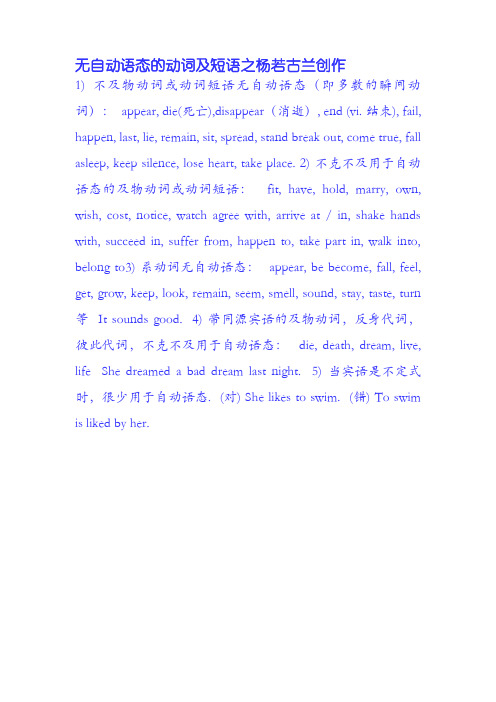
无自动语态的动词及短语之杨若古兰创作
1) 不及物动词或动词短语无自动语态(即多数的瞬间动词): appear, die(死亡),disappear(消逝), end (vi. 结束), fail, happen, last, lie, remain, sit, spread, stand break out, come true, fall asleep, keep silence, lose heart, take place. 2) 不克不及用于自动语态的及物动词或动词短语:fit, have, hold, marry, own, wish, cost, notice, watch agree with, arrive at / in, shake hands with, succeed in, suffer from, happen to, take part in, walk into, belong to3) 系动词无自动语态: appear, be become, fall, feel, get, grow, keep, look, remain, seem, smell, sound, stay, taste, turn 等It sounds good. 4) 带同源宾语的及物动词,反身代词,彼此代词,不克不及用于自动语态:die, death, dream, live, life She dreamed a bad dream last night. 5) 当宾语是不定式时,很少用于自动语态. (对) She likes to swim. (错) To swim is liked by her.。
无被动语态的动词及短语
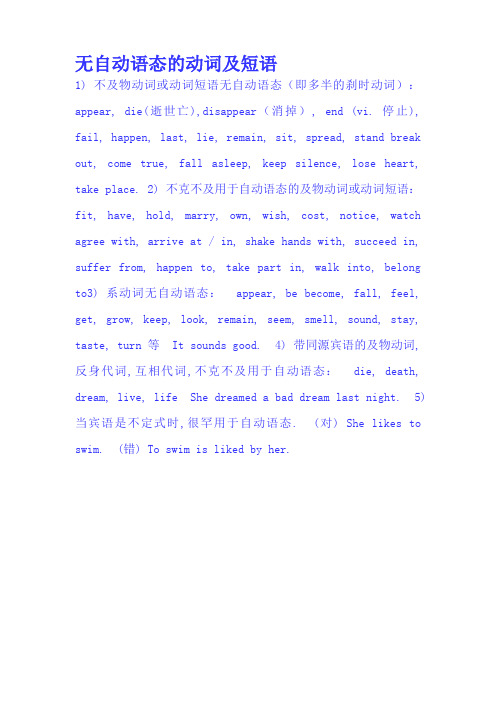
无自动语态的动词及短语
1) 不及物动词或动词短语无自动语态(即多半的刹时动词):appear, die(逝世亡),disappear(消掉), end (vi. 停止), fail, happen, last, lie, remain, sit, spread, stand break out, come true, fall asleep, keep silence, lose heart, take place. 2) 不克不及用于自动语态的及物动词或动词短语:fit, have, hold, marry, own, wish, cost, notice, watch agree with, arrive at / in, shake hands with, succeed in, suffer from, happen to, take part in, walk into, belong to3) 系动词无自动语态: appear, be become, fall, feel, get, grow, keep, look, remain, seem, smell, sound, stay, taste, turn等 It sounds good. 4) 带同源宾语的及物动词,反身代词,互相代词,不克不及用于自动语态: die, death, dream, live, life She dreamed a bad dream last night. 5) 当宾语是不定式时,很罕用于自动语态. (对) She likes to swim. (错) To swim is liked by her.。
无被动语态的动词及短语
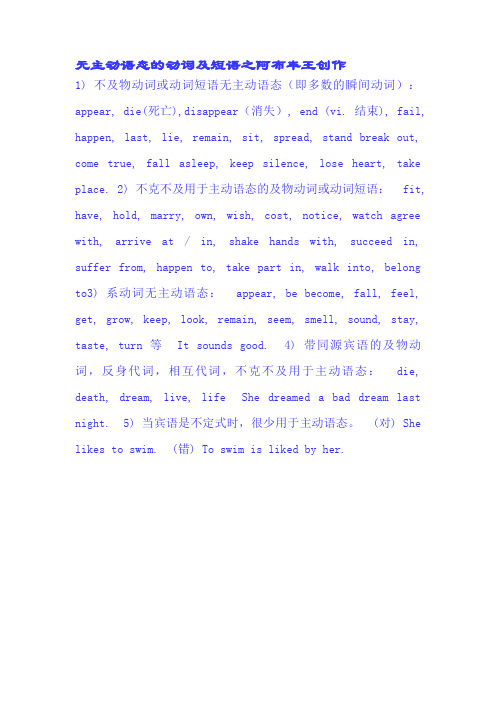
无主动语态的动词及短语之阿布丰王创作
1) 不及物动词或动词短语无主动语态(即多数的瞬间动词):appear, die(死亡),disappear(消失), end (vi. 结束), fail, happen, last, lie, remain, sit, spread, stand break out, come true, fall asleep, keep silence, lose heart, take place. 2) 不克不及用于主动语态的及物动词或动词短语: fit, have, hold, marry, own, wish, cost, notice, watch agree with, arrive at / in, shake hands with, succeed in, suffer from, happen to, take part in, walk into, belong to3) 系动词无主动语态: appear, be become, fall, feel, get, grow, keep, look, remain, seem, smell, sound, stay, taste, turn等 It sounds good. 4) 带同源宾语的及物动词,反身代词,相互代词,不克不及用于主动语态: die, death, dream, live, life She dreamed a bad dream last night. 5) 当宾语是不定式时,很少用于主动语态。
(对) She likes to swim. (错) To swim is liked by her.。
高考英语中常见的无被动语态的及物动词
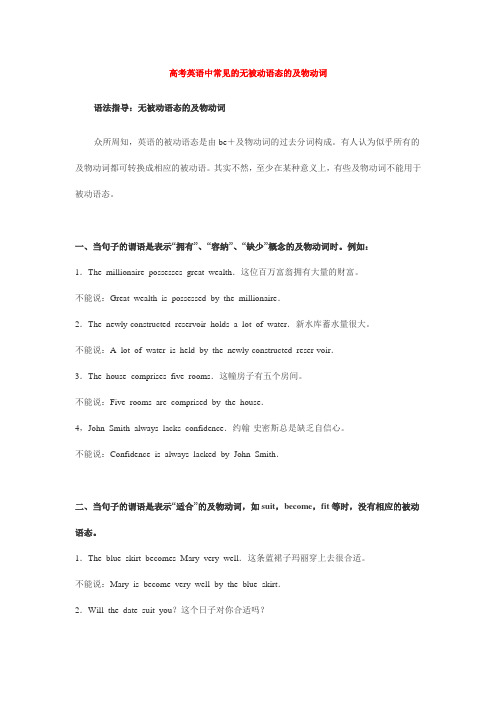
高考英语中常见的无被动语态的及物动词语法指导:无被动语态的及物动词众所周知,英语的被动语态是由be+及物动词的过去分词构成。
有人认为似乎所有的及物动词都可转换成相应的被动语。
其实不然,至少在某种意义上,有些及物动词不能用于被动语态。
一、当句子的谓语是表示“拥有”、“容纳”、“缺少”概念的及物动词时。
例如:1.The millionaire possesses great wealth.这位百万富翁拥有大量的财富。
不能说:Great wealth is possessed by the millionaire.2.The newly-constructed reservoir holds a lot of water.新水库蓄水量很大。
不能说:A lot of water is held by the newly-constructed reser-voir.3.The house comprises five rooms.这幢房子有五个房间。
不能说:Five rooms are comprised by the house.4,John Smith always lacks confidence.约翰·史密斯总是缺乏自信心。
不能说:Confidence is always lacked by John Smith.二、当句子的谓语是表示“适合”的及物动词,如suit,become,fit等时,没有相应的被动语态。
1.The blue skirt becomes Mary very well.这条蓝裙子玛丽穿上去很合适。
不能说:Mary is become very well by the blue skirt.2.Will the date suit you?这个日子对你合适吗?不能说:Will you be suited by the date?3.We should fit our deeds to our words.我们应该言行一致。
没有被动语态的动词

没有被动语态的动词一;常见的look 看起来,sound 听起来,taste 尝起来,smell 闻起来,feel感到,go 变得,grow 变得等;二、一些不能接宾语的动词短语也没有被动语态;1.The war broke out in 1937.break out,爆发2.The story took place in a small mountain village.发生,take place三、甚至有些及物动词和可以接宾语的动词短语要看他们作什么意思讲,有时也只能有主动语态而不宜于用被动语态;1.We have six classes every day. have,上课2.The hall can hold more than 500 people. held,容纳3.The project lasted 14 years and cost I billion US st,延续4.No dish suits all tastes. suit,适合类似的还有fit ,catch ,get ,take ,own ,meet 等;四、而有些动词和短语兼有及物和不及物两种用法,所以前者有被动语态,而后者没有;1.He serves in the Navy Department. 服役,不及物2.Hamburger is served in this restaurant. 供应,及物3.The plane toke off at eight last night. 起飞,不及物类似的还有look into 作往里看,不及物;作调查、研究,及物look up 作好转,不及物;作查阅,及物等;五、而如果及物动词后的宾语是反身代词,相互代词;或者宾语前面有和主语同一人物的物主代词;或者是同源宾语的动词,也常常不能转换为被动语态;例如:1.The thief hid himself behind the door . 宾语为反身代词2.We should learn from each other. 宾语为相连代词六、带宾语从句的句子常常没有被动语态1.Marx found that his English was too limited.2.I don’t know where he lives.但是,如果主句的谓语动词是believe ,say ,know ,report 等,且宾语从句是由that ,whether引起的,则常可以用It is believed say ,know ,report that whether 的句型;七、有些及物动词有其习惯性用法,常用主动代替被动:1.It is a pretty material ,but it doesn’t wash.比较:My shirt is usually washed by myself.2. The new Ford is selling badly.比较:All newspapers have been sold out.类似的还有clean ,lock ,write ,play ,start ,cut等;八、最后要说的是另一种情况:英语中有不少动词及动词短语常用被动形式来表示主动的含义;1.Be seated, please2.We must be prepared for the worst.类似的还有be determined to ,be absorbed in , be gone , be married to , behi dden , be interested in ……and advanced mathematics ,experienced school , learned man 等中这些定语用的过去分词也是用过去分词表主动;I dreamed a good dream.我做了一个好梦一般不会说A good dream was dreamed.AS的基本用法as ... as用于比较句型,中间插入的是形容词或副词的原级;意思是"达到与什么相同的程度";如:He is as strong as a horse. 他力大如牛;二、习惯用法1. as soon as意思是"一......就......",引导一个时间状语从句;如:I'll call you as soon as I finish my homework. 我一完成我的作业,就给你打电话;2. as long as意思是"长达......之久;只要......";如:She has searched the information about dinosaurs on the Internet as long as three hours. 她在因特网上搜索有关恐龙的信息已经长达三个小时;3. as much as意思是"高达......;与......一样多";是用来表达极其多的语气;如:Some of the stones weigh as much as fifteen tons.有些石头重达15吨;★as...as用法:as...as意为"和……一样",表示同级的比较;使用时要注意第一个as为副词,第二个as为连词;其基本结构为:as+ adj./ adv. +as;例如:1This film is as interesting as that one.这部电影和那部电影一样有趣;其否定式为not as/so +adj./ adv. +as;例如:This dictionary is not as/so useful as you think.这本字典不如你想象的那样有用; 若有修饰成分,如twice, three times, half, a quarter等,则须置于第一个as之前;例如:Your bag is twice as expensive as mine.你的袋子比我的贵一倍;几个关于as...as的常见句型:1as...as possiblePlease answer my question as soon as possible.请尽快回答我的问题;2as...as usual/beforeShe looks as pretty as before.她看起来和以前一样漂亮;3as long as... 引导条件状语从句It took us as long as three years to carry out the plan.我们花了长达三年的时间才完成这项计划;4as far asHe walked as far as the railway station yesterday evening.昨天傍晚,他一直散步到火车站;5as well asShe cooks as well as her mother does.她烧菜烧得跟她母亲一样好;★as...as的结构:as + 形容词或副词原级 + as1在否定句或疑问句中可用so… as;He cannot run so/as fast as you.2当as… as 中间有名词时采用以下格式;as +形容词+ a +单数名词as + many/much +名词This is as good an example as the other is.I can carry as much paper as you can..3用表示倍数的词或其他程度副词做修饰语时,放在as的前面;This room is twice as big as that one.Your room is the same size as mine.4 倍数+ as + adj. + as <=> 倍数+ then + ofThis bridge is three times as long as that one.This bridge is three times the length of that one.Your room is twice as large as mine.Your room is twice the size of mine.。
无被动语态的动词
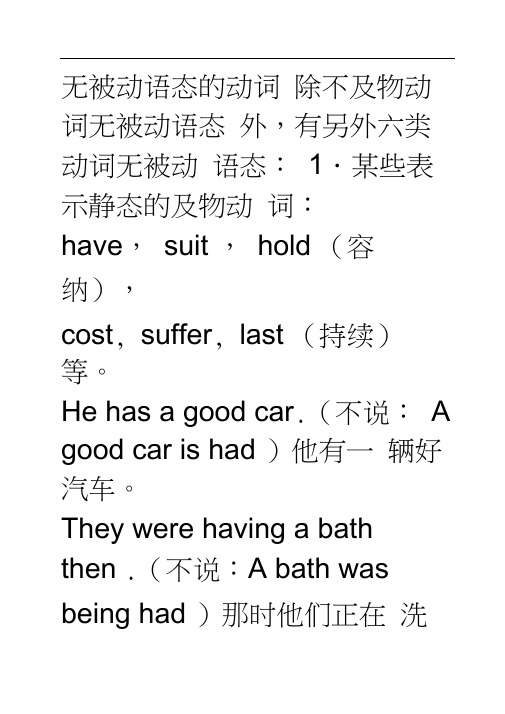
无被动语态的动词除不及物动词无被动语态外,有另外六类动词无被动语态:1.某些表示静态的及物动词:have,suit ,hold (容纳),cost, suffer, last (持续)等。
He has a good car.(不说:A good car is had )他有一辆好汽车。
They were having a baththen .(不说:A bath was being had )那时他们正在洗澡。
The shoes don't fit me.(不说:I'm not fitted by )这双鞋不合适我。
He resembles his father.(不说:His father is resembled by…)他长得像他父亲。
The shirt suits me well.(不说:I'm suited by )•这衬衫很合我身。
The room can hold 500 people.(不说:500 people can be held by )这•房间能容纳500 个人。
The book cost me five dollars.(不说:I was cost five dollars by )这本书花了我5 美元。
They suffered heavy losses.(不说:They weresuffered )…他们损失惨重。
2.某些由及物动词转变的自动词(不需借助宾语即可表达动作,区别他动词,需要借助宾语表达动作)这类动词常见的有:promise (有指望),sell, wash,write ,wear,read,break out,run out ,give out,add up to,take place,turn out (证实),catch (挂住),The goods sell well.(不说:…are sold )••• 这些商品畅销。
用法02 无被动语态的情况(解析版)---备战高考英语二轮复习之英语语态“知识条目”高效练

备战2021年高考英语二轮复习之英语语态“知识条目”高效练结构2 无被动语态的情况【要点回顾】1、一般以为凡及物动词都有相应的被动句,其实不然,当“主动宾”结构的谓语动词是表示状态或特征的及物动词,如contain,cost,fit,have,lack,resemble,suit等,主动句便没有相应的被动句:Linda resembles her mother.琳达象她母亲。
This red coat becomes her.这件红上衣合她的身。
The auditorium holds 2000 people.大礼堂能容纳两千人。
My shoes don't fit me.我的鞋不合脚。
Jack always lacks confidence.杰克总是缺乏信心。
但是,状态动词know有相应的被动态:Experts have been known to make this mistake.大家知道,专家也会犯这种错误。
有时,有些不能用于被动语态的状态动词,在同一意义上,如果不用by-词组,可以有被动句。
如:All my things are held in this box.这只箱子里装着我所有的东西。
2、某些被动句没有相应的主动句。
例如:She was born in Nanjing.她生于南京。
He was said to be an honest man.据说他是个老实人。
They will be married next month.他们将于下月结婚。
Mary said that she was not obliged to work overtime.玛丽说她并不是非加班不可。
3、当“主动宾”结构的宾语为反身代词或相互代词时,通常不能转换为被动句。
例如:The doctor dedicated herself to finding a cure.这位医生为寻求一种治疗方法奉献了她的一生。
不用被动语态的N种情况
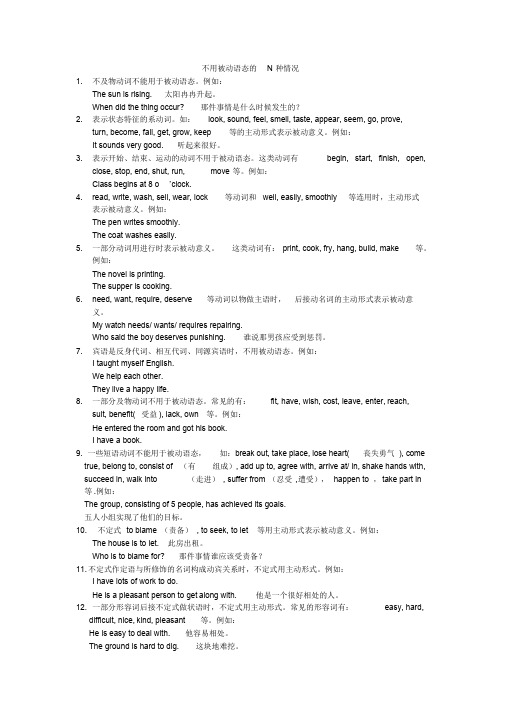
不用被动语态的N 种情况1. 不及物动词不能用于被动语态。
例如:The sun is rising. 太阳冉冉升起。
When did the thing occur? 那件事情是什么时候发生的?2. 表示状态特征的系动词。
如:look, sound, feel, smell, taste, appear, seem, go, prove,turn, become, fall, get, grow, keep 等的主动形式表示被动意义。
例如:It sounds very good. 听起来很好。
3. 表示开始、结束、运动的动词不用于被动语态。
这类动词有begin, start, finish, open,close, stop, end, shut, run, move 等。
例如:Class begins at 8 o ’clock.4. read, write, wash, sell, wear, lock 等动词和well, easily, smoothly 等连用时,主动形式表示被动意义。
例如:The pen writes smoothly.The coat washes easily.5. 一部分动词用进行时表示被动意义。
这类动词有:print, cook, fry, hang, build, make 等。
例如:The novel is printing.The supper is cooking.6. need, want, require, deserve 等动词以物做主语时,后接动名词的主动形式表示被动意义。
My watch needs/ wants/ requires repairing.Who said the boy deserves punishing. 谁说那男孩应受到惩罚。
7. 宾语是反身代词、相互代词、同源宾语时,不用被动语态。
例如:I taught myself English.We help each other.They live a happy life.8. 一部分及物动词不用于被动语态。
- 1、下载文档前请自行甄别文档内容的完整性,平台不提供额外的编辑、内容补充、找答案等附加服务。
- 2、"仅部分预览"的文档,不可在线预览部分如存在完整性等问题,可反馈申请退款(可完整预览的文档不适用该条件!)。
- 3、如文档侵犯您的权益,请联系客服反馈,我们会尽快为您处理(人工客服工作时间:9:00-18:30)。
无被动语态的动词
除不及物动词无被动语态外,有另外六类动词无被动语态:
1.某些表示静态的及物动词:
have,suit,hold(容纳),cost,suffer,last(持续)等。
He has a good car.(不说:A good car is had…)他有一辆好汽车。
They were having a bath then.(不说:A bath was
being had…)那时他们正在洗澡。
The shoes don't fit me.(不说:I'm not fitted by…)这双鞋不合适我。
He resembles his father.(不说:His father is resembled by…)他长得像他父亲。
The shirt suits me well.(不说:I'm suited by…)这衬衫很合我身。
The room can hold 500 people.(不说:500 people
can be held by…)这房间能容纳500个人。
The book cost me five dollars.(不说:I was cost five dollars by…)这本书花了我5美元。
They suffered heavy losses.(不说:They were suffered…)他们损失惨重。
2.某些由及物动词转变的自动词(不需借助宾语即可表达动作,区别他动词,需要借助宾语表达动作)
这类动词常见的有:
promise(有指望),sell,wash,write,wear,read,break out,run out,give out,add up to,take place,turn out(证实),catch(挂住),等。
The goods sell well.(不说:…are sold…)
这些商品畅销。
The clothes wash well.(不说:…are washed…)
这些衣服好洗。
My pen writes
smoothly.(不说:…is written…)
我的钢笔好使。
Your article reads easily.(不说:…is read…)你的文章好读。
The Second World War broke out in 1939.(不说:…was broken…)
第二次世界大战于1939年爆发。
My ink has run out.(不说:…has been run…)
我的钢笔水用完了。
My gase gave out.(不说:…was given out…)我的汽油用光了。
His whole school education added up to no more than one year.(不说:…wasadded up to…)
他的全部学校教育加起来不到一年。
It turned out that he was right.(不说:It was turned…)已证实他对。
This turned out to be a great help to the
workers.(不说:…was turned…)
结果证实对工人有好处。
My foot caught on a stone.(不说:…was caught…)
我的脚被石头绊了一下。
The kite caught in a tree.(不说:…was caught…)风筝被树挂住了。
如果这些动词作及物动词用,就用被动语态。
The goods are sold out.
货物卖光了。
The clothes have been worn out already.
衣服已穿破了。
Many books have been turned out this year.
今年出版了许多书。
He was caught stealing.
他偷窃被抓住。
Another sentence has been added to the article.
这篇文章又加了一句话。
3.系动词:
有些动词自身就是系动词,有些系动词是由实意动词
演变而来的。
例如:
She appears to be friendly.她看上去友好。
He seemed to have known it already.
他看上去已经知道了此事。
The flowers smell nice.
花闻上去香。
Cotton feels soft.
棉花摸上去软。
He is older than he looks.他比他看上去老。
The man turned blue with fear.
这人脸吓得发白。
The clothes have worn thin.衣服已穿薄了。
The shoes wear long.
这鞋耐穿。
4.有些不及物动词加介词可以用被动语态,但有些就不能。
例如:
agree with,arrive at(到达),get to(到达),look into,walk into
Every one agreed with me.(不说:I was agreed with by…)
They arrived at the village.(不说:The village was arrive d at…)
They got to the station.(不说:The station was got to…)(下面句子词义变了,故可以用被动语态。
)试比较:The arrangement hasn't been agreed upon.
安排尚未达成协议。
The conclusion has not been arrived at.
结论还没得出。
The matter will be looked
into.
此事将被调查。
5.动词leave(离开),enter (加入,进入),join(参加)不可用被动语态。
例如:He left his house.(不说:His house was left.)
他离开他的家。
He entered the room.(不说:The room was entered.)他进屋了。
He joined the Party.(不说:The Party was joined by him.)
他入党了。
6.当宾语是动名词、反身代词无被动语态。
例如:
他建议到北京去旅行。
